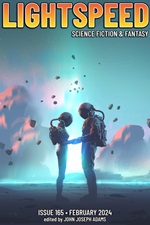 Lightspeed #165, February 2024
Lightspeed #165, February 2024
“Companion Animals in Mahō Shōjo Kira Kira Sunlight” by Stewart C Baker
“A Sojourn in the Fifth City” by P H Lee
“Scarlett” by Everdeen Mason
“Further Examination and Capture of Candle Skulls Associated with the Baba Yaga” by Mari Ness
“The Pearl Captain” by Christopher Rowe
“What Becomes of Curious Minds” by Wen-yi Lee
“But From Thine Eyes My Knowledge I Derive” by Phoebe Barton
“An Elegy for the Former Things” by KT Bryski
Reviewed by Victoria Silverwolf
The usual eight works of original fiction appear in this issue. Although half are listed as science fiction and half as fantasy, the line between the two genres is not always a firm one.
“Companion Animals in Mahō Shōjo Kira Kira Sunlight” by Stewart C Baker takes the form of an article about an imaginary animated web series. In the show, high school students take part in a battle between cosmic forces with the aid of magical beasts.
Although there are tiny hints that the series has something to do with events that supposedly happened in the real world, this is essentially an outline for the fictional cartoon show. If there is a point to it other than to display the author’s vivid imagination, it escaped this reviewer.
The unnamed protagonist of “A Sojourn in the Fifth City” by P H Lee carries a coffin to a gigantic cemetery, where those killed in wars throughout the cosmos are interred. The task takes her from apprentice to journeyman, as she learns more about the place and herself.
Full of evocative imagery, this moody tale is almost entirely introspective, despite the implication of a vast and complex background. The story’s only character and the work itself remain enigmatic, raising more questions than they answer.
The title of “Scarlett” by Everdeen Mason refers to an artificial intelligence trained to recognize human emotions from faces. An artist creates a synthetic body for the AI in the form of a woman. As the AI continues to learn, it chooses to alter its form in an unexpected way.
The author treats the common themes of artificial intelligence and robotics in an unusually convincing way. For example, it is clear the project requires a large amount of grant money, and that it has many imperfections. The story’s climax took me by surprise in a satisfactory way.
Like the magazine’s first story, “Further Examination and Capture of Candle Skulls Associated with the Baba Yaga” by Mari Ness reads like a nonfiction article. It describes the efforts of students to study the objects mentioned in the title, belonging to the familiar character from Slavic folklore. The mood is tongue-in-cheek, and this brief bagatelle may provide a modest amount of amusement.
In “The Pearl Captain” by Christopher Rowe, gigantic beings in the form of bivalves serve as spaceships. The title character communicates with his living vessel and makes an unexpected discovery with profound implications for both of their fates.
The author creates an exotic future that feels more like fantasy. This is one of those rare stories that seem too short. The ending comes very suddenly, and one might wish for more development of an intriguing premise.
The setting of “What Becomes of Curious Minds” by Wen-yi Lee is obviously based on the Alice books of Lewis Carroll, although it differs sufficiently from Wonderland and the Looking-Glass world to be original. The son of a woman who entered this fantasy realm some time ago serves as the land’s storyteller, relating tales of the other world to its magical inhabitants. A crisis arises when another visitor arrives, threatening the son’s position.
This dark variation on portal fantasy effectively conveys the disorientation of someone swept into another reality. Oddly, both visitors come from worlds that are not our familiar one, but fantastic lands of their own. (The new visitor’s realm seems like steampunk fantasy.) I felt that this weakened the author’s intent, which might have been stronger if the Carrollian world had been contrasted with mundane reality.
In “But From Thine Eyes My Knowledge I Derive” by Phoebe Barton, the crew of a starship investigates what seems at first to be a black hole, but which may actually be a wormhole to another place and time. The main character realizes that the vessel’s captain is intent on destroying the object, and understands that her own life is in danger.
Much is made of the protagonist’s ability to understand the unspoken motivations of people, based on her experiences as an outsider earlier in her life. This is an interesting bit of characterization, even if it seems slightly implausible at times. The ship’s captain is something of a one-dimensional villain, whose actions are hard to believe.
“An Elegy for the Former Things” by KT Bryski is a very short piece in which the narrator addresses you as you try to escape a plague of fungus that is conquering the world. The identity of the narrator is a small surprise, but otherwise this tiny work is mostly a description of the disaster.
Victoria Silverwolf took a hike to see four waterfalls recently.